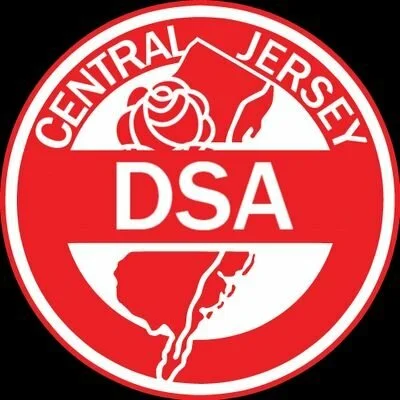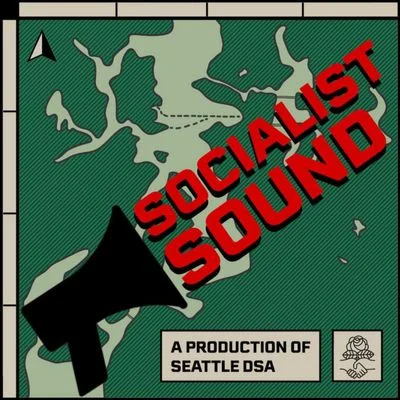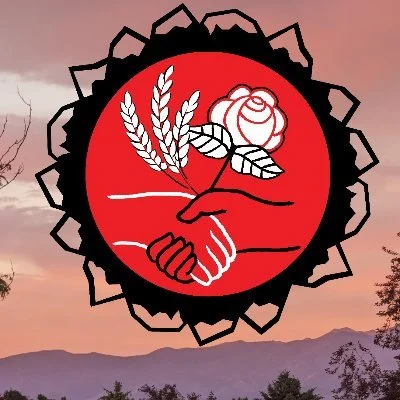

Reading on international law and the war against Gaza


The State of Public Power in 2023


Book Review: The Man Who Changed Colors


The Hope of the World: 2023 Labor Year in Review
2023 has been a major year for workers so far, and the momentum shows no signs of slowing down as we head into 2024. While major strikes by UAW at the Big Three in the auto industry and by WGA and SAG-AFTRA in the entertainment world are making headlines, thousands of workers across the country are taking action in ways big and small that you may not always hear about. On this show, we're joined live by Jenny Brown, assistant editor at Labor Notes and author of Birth Strike: The Hidden Fight Over Women’s Work, to discuss the labor year so far and what organizers can learn going into 2024.
We also hear from Evan, vice chair of the Graduate Center Chapter of the Professional Staff Congress at CUNY, on how union organizers are protecting the free speech of Palestinian solidarity activists on campus.


Harassment And Grievance Policy
Central NJ Democratic Socialists (“CNJ DSA”) is committed to providing a safe and inclusive environment for everyone, regardless of gender, race, or class, to organize without fear of harassment. We aim to design a space that amplifies and protects marginalized voices by developing a policy for reporting grievances based on the harassment policy Resolution 33 which was passed at the DSA National Convention in August 2017, while adding several extra protections not guaranteed by the Resolution and an eye towards restorative justice, healing, and victim support.
DSA’s national harassment policy can be found at: https://www.dsausa.org/about-us/harassment-policy-resolution-33/
Section 1.0 Policy Overview
A. Scope Of This Policy
Prohibited behavior. Members shall not engage in harassment on the basis of sex, gender, gender identity or expression, sexual orientation, physical appearance, disability, race, color, religion, national origin, class, age, or profession. Harassing or abusive behavior, such as unwelcome attention, inappropriate or offensive remarks, slurs, or jokes, physical or verbal intimidation, stalking, inappropriate physical contact or proximity, and other verbal and physical conduct constitute harassment when:
- Submission to such conduct is made either explicitly or implicitly a term or condition of a member’s continued affiliation with DSA;
- Submission or rejection of such conduct by an individual is used as the basis for organizational decisions affecting such individual; or
- Such conduct has the purpose or effect of creating a hostile environment interfering with an individual’s capacity to organize within DSA.
- Other protected classes. Harassment based on categories not encompassed by those listed section (a) will be evaluated at the discretion of the Harassment and Grievance Officer (“HGO”) and Steering Committee (“SC”) representatives.
- Members may also file grievances not directed at a specific individual, such as hostile environments and other systemic issues. Investigation in these cases shall center and seek to support the grievant in determining the appropriate remedy.
B. Reporting Harassment
Complaints. Members may follow the standard complaint process as set out in the following sections if they believe they have been harassed by another member. Time Limitations. There will be no time limits requiring the grievant to file a report within any amount of time after the alleged harassment has occurred.
C. This document describes the complaint procedure adopted by CNJ DSA. If any grievant does not feel that their concerns can be adequately addressed by CNJ DSA, they may pursue a complaint with National Grievance Officers and the NPC without going through the Chapter procedure first.
D. The SC of CNJ DSA will publicize this policy and make HGO contact information available to membership as often as possible, including, but not limited to: Chapter- wide emails, meeting agendas, social media, and online chapter communication platforms.
Section 2.0 Harassment and Grievance Officers
A. Membership shall elect two members to serve as HGOs. Due to the gendered nature of many harassment complaints at the National level, no more than one HGO may be cismale. HGOs may not be SC members, but may run for Steering Committee when their HGO term has ended. Election of HGOs will follow standard procedures outlined in the Chapter bylaws. HGOs will serve staggered two-year terms.
B. HGO Responsibilities
- Receive, acknowledge receipt of, and archive grievant reports
- Contact the accused to notify them of the accusations, request their written response, and archive any written response
- Conduct any necessary investigation of the claim
- Present their findings to the Steering Committee with a written report.
- If necessary, take disciplinary action and report the discipline administered to the Steering Committee.
- Present an anonymized version of the report to deliver to membership after conclusion of an investigation. The HGOs may make exceptions to anonymity in service of the restorative justice process, in the case of any member who has been removed from the chapter permanently or temporarily as a result of the investigation.
- Compile a yearly report that details:
- How many reports were made
- How many were taken to the formal disciplinary process
- How many disciplinary actions were taken
- Any recommended changes for making the reporting system effective, preferably informed by survey of membership
C. Removal of an HGO.
An HGO may resign at any time. If an HGO fails to perform their duties fairly, diligently, and ethically, there may be cause for removal. The SC may remove an HGO by majority vote after the HGO is informed of the cause for removal and given the opportunity to self- advocate to the SC.
Section 3.0 Complaints
A. Making A Complaint The SC will establish a confidential email for submitting complaints, which is monitored only by the HGOs. Login information will be changed at each new term or sooner. The SC will make a complaint form available upon request that is linked to the HGO email.
On the form, the grievant may have the option to submit the complaint as an emergency, in which case an expedited investigation will take place. If a grievant objects to both HGOs viewing a complaint, they may contact one HGO directly and confidentially. The identities of all involved parties will remain confidential to everyone who is not an HGO, including the SC (and at the request of the grievant, disclosure may also be denied to the HGO not currently investigating the case), pending the outcome of the investigation, except as necessary for a complete investigation. Multiple complaints against one person may be consolidated into a single investigation. Any grievant may veto this consolidation. Grievants have the right to a proxy or representative of their choosing to speak on their behalf and act as the primary contact with HGOs throughout the investigation.
B. Recusal
An HGO is required to recuse themselves from any investigation involving either a complainant or accused who is a close friend or family member of the HGO, or with whom the HGO has an extensive working relationship or past or present romantic or sexual relationship. An HGO should also recuse themselves if other conflicts would present an appearance of impropriety. Such potential conflicts may be raised by any party or by any member of leadership at the outset of an investigation and may be determined by other
Section 4.0 Responding To A Complaint
A. Informal conversation/mediation
Some complaints may be resolved without the need for a formal grievance process. In this case, there may be an informal conversation between parties mediated by an HGO. In an informal mediation, all parties must attend voluntarily and express a desire for resolution; the HGO remains neutral; each person has the ability to state their perspectives uninterrupted; the mediator may follow the general structure of affective questioning; and the goal is to find a solution to the conflict that is primarily developed and mutually agreed upon by all parties. a final summary of the conversation is made available to the SC, but the SC does not participate in the results of the mediation.
B. Filing Official Grievance.
After a written report has been submitted, whether through the email hotline or otherwise:
- The HGO(s) will contact the grievant within three days to acknowledge receipt of the complaint and set up a conversation.
- The HGO(s) will contact the accused member within five days to notify them that a report has been filed against them and request a written response to the report either affirming or denying its substance.
- The accused will submit their written response within seven days of being notified. If the accused fails to meet this deadline or request an extension, the HGO will consult the grievant first regarding appropriate disciplinary measures.
- If the accused denies the substance of the report, the HGO will set up a conversation. The HGO overseeing the dispute will have the option to investigate the report by:
- interviewing other members with direct knowledge of the substance of the report;
- requesting documentation from either the grievant or accused or any other parties directly involved; or
- employing any and all other means deemed necessary, with the utmost respect for the confidentiality and emotional needs of the parties, within a time period not to exceed ten days.
- When victims are closed out of the disciplinary process, they are re-victimized. In order to avoid replicating the oppressive structures of our current judicial system, before reaching a conclusion, the HGO(s) will schedule a final conversation with the grievant following the general guidelines of post-conflict affective questioning. The purpose is to amplify the voices of victims and consider their needs and perspectives when moving forward with disciplinary action or otherwise.
C. The HGO(s) responsible for investigating the dispute will determine whether the report is credible and take appropriate disciplinary action, if necessary, as soon as practicable, without exceeding thirty days. The HGO(s) may notify SC of the accuser’s report and its substance at any time after the report is filed, but must give written notice to both the accuser and the accused member before doing so.
Section 5.0 Remedies and penalties
A. Determinations
All reports will be assessed on a case-by-case basis by the HGO(s) associated with the accuser’s reporting channel. The ultimate determination in each case will be made by the HGO(s).
B. Standard for Determining if a Report is Credible
The HGOs will find a factual allegation is “credible” if it more-likely-than-not occurred.
C. Remedies and Penalties
- If the HGOs find a factual allegation to be credible, they are authorized to carry out disciplinary action, which may include:
- A formal discussion between the accused and the HGOs and/or Steering Committee to develop a plan for repairing the harm;
- Suspension from committee meetings and other chapter or organizational events;
- Removal from chapter committee(s);
- Removal from the chapter; and
- Any and all other relief deemed necessary and just by the HGO(s).
- The SC will enforce any suspensions or expulsions in accordance with chapter procedures.
Section 6.0 Appeals Process
A. Either party may appeal the final result of the grievance by filling out an appeal form, available upon request from an HGO or the Steering Committee. Appeals must be filed within thirty days of receiving written notice of the decision. The limited grounds for appeal are:
- Either party believes the behavior was not interpreted using the standards for harassment set out in Section 1a;
- Procedural errors, misconduct, or conflicts of interest affected the fairness of the outcome; and
- The remedy or penalty determined by the HGOs was disproportionate to the violation committed
B. Appeals will be heard by the Harassment and Grievance Officers of North or South Jersey DSA, provided they have adopted a policy agreeing to this arrangement. They will follow Central Jersey’s grievance policy in deciding the appeal.
C. Nothing in this policy can limit a member’s right to file an appeal directly with the national organization.
Section 7.0 Retaliation
This policy prohibits retaliation against any member for bringing a complaint of harassment pursuant to this policy. This policy also prohibits retaliation against a person who assists someone with a complaint of harassment, or participates in any manner in an investigation or resolution of a complaint of discrimination or harassment. Retaliatory behaviors includes threats, intimidation, reprisals, and/or adverse actions related to organizing. If any party to the complaint believes there has been retaliation, they may inform the HGO who will determine whether to factor the retaliation into the original complaint, or treat it as an individual incident.
The post Harassment And Grievance Policy appeared first on Central NJ DSA.


Huge Wins for DSA Initiatives in Tacoma and Bellingham
On November 7th Tacoma voters passed the strongest tenant protections in Washington State, despite the landlord opposition shattering all previous spending records to defeat us. Tacoma DSA launched the campaign and built Tacoma for All into a broad labor-community coalition to win Initiative #1. We overcame efforts by the Mayor and City Council to derail our campaign, first by attempting to co-opt the movement with a watered down alternative, and then with a competing initiative.
Backed by the 8,000 grocery workers in UFCW 367 and the wider Pierce County Central Labor Council, Tacoma for All built a 100-strong volunteer army to knock over 20,000 doors. The victory of Initiative #1, and DSA-endorsed city council candidate Jamika Scott, has transformed DSA into a center of gravity for working-class politics in Tacoma.
Meanwhile, Whatcom DSA helped win two major ballot initiatives: one to raise the minimum wage in Bellingham, and a second to compel landlords pay tenants relocation assistance when rent hikes over 8% force renters to move. DSA plays a central role in Community First Whatcom, the coalition behind both initiatives. After winning two ballot initiatives in 2021, this is the second round of victories for Whatcom DSA and the coalition, cementing the organized left as major force in Bellingham politics.
My first interview is with four fellow leaders of Tacoma DSA, who co-led the initiative campaign with me. My second interview is with Cleveland Harris, a leader in Whatcom DSA and the chair of Community First Whatcom.
Thanks to Jason Corey and Max van Ginneken for mixing and editing the audio for this episode, and to Val Ross for the cover art.


Election Day Deep Dive
Earlier this month, voters nationwide went to the polls. In Ohio, The Right to Reproductive Freedom with Protections for Health and Safety, listed on the ballot as Issue 1, passed with 57% of Ohioians voting to codify a right to an abortion, contraception, and other reproductive rights into the state Constitution, in a clear rebuke to the near total-ban on abortion pushed through by the far-right Republican Ohio Legislature in the wake of the Supreme Court Dobbs Decision. While here in New York, voters elected their City Council members, and DSA-endorsed incumbents, Tiffany Caban of District 22 in Queens and Alexa Aviles of District 38 in Sunset Park, won resounding bids for reelection in their districts. Tonight, we will hear from Julie from Cleveland DSA, about the statewide effort across several Ohio DSA chapters to mobilize voters to the polls in support of reproductive rights. We will also be joined in-studio with Stef from NYC-DSA Electoral Working Group and Anna from the Aviles campaign to discuss the City Council races and what’s in store for DSA electoral politics in 2024.
You can become a DSA member at https://act.dsausa.org/donate/membership/
To get more involved in the NYC DSA Electoral Working Group go to https://socialists.nyc/ or email at electoral@socialists.nyc
To join a phonebank to call for a ceasefire in Gaza, visit https://www.dsausa.org/no-money-for-massacres-phonebanks/


Comradesgiving
Join us this Sunday for Comradesgiving, November 26 from 3:00 to 5:30pm at the Gallatin Labor Temple. We will be sharing food and continuing the conversation around Social Housing and why a Public Housing Authority is needed. We will also be practicing how to write and submit public comment in preparation for the upcoming Gallatin County Commission hearing (Tues 11/28) to determine whether a Public Housing Authority should be established at the county level. Join us for a potluck with comrades. Multiple dietary restrictions are being considered, including vegan and vegetarian options. RSVP here.
Can’t make it, but want to show your support for establishing a PHA? See here for directions for submitting public comment to the Gallatin County Commissioners. Public comment for the County is due by November 27.


Local Residents Rally to Support a Ceasefire in Gaza
Over 200 Wilmingtonians came out on November 19 to show their support for a ceasefire in Gaza and end to Israeli apartheid. The event was organized by members of a local pro-Palestinian group along with Wilmington DSA members and our comrades in Liberate ILM. We urged the crowd to sign the open letter demanding a ceasefire resolution and to commit to boycotting companies that are doing business with Israel as part of the Palestinian Boycott, Divestment, and Sanctions (BDS) campaign. We had several great speakers who shared personal connections to loved ones in Palestine and others who educated the crowd on the role of the apartheid state in maintaining capitalist hegemony in the Middle East, including a speech from our Chair to wrap up the afternoon. DSA provided safety marshals and manned the poster making station so that attendees could create their own sign to show support for human rights and for peace.
What are our demands?
As socialists, we stand against settler colonialism and genocide. We understand the role that Israel plays in the U.S. imperial war machine and that the genocide being perpetuated by Israel is primarily funded by the United States.
Our immediate demands are simple:
- An immediate ceasefire and end to collective punishment.
- Humanitarian aid to Gaza.
- Equal rights for all Palestinians.

How can you get involved?
You can stay up to date on local action and changes to our campaign by bookmarking our Palestinian Liberation webpage.
- Sign the open letter demanding a ceasefire resolution from our local government officials.
- Show up to events! We need your support to show elected officials that they face serious pressure for continuing to stand with an apartheid state.
- Volunteer your time. We need folks to help put on rallies, print fliers, and call people and our representatives. Email the chapter and we can get you set up.


SCAD is Bad
Durham's tenants are in a crisis, and despite proponent’s claims, the developer-and-landlord-led “fix” to the building code known as “Simplifying Code for Affordable Development,” or SCAD, will neither solve or barely improve affordable housing in our community. Rising rents in Durham are displacing residents, mostly from working-class Black and brown communities, to make room for mostly wealthier and whiter tenants. Our elected officials are left to accept the neoliberal myth that “the market will find a solution” and yet, despite having green-lit a lot of new development, affordable housing units remain at a premium. Durham City Council should vote against SCAD.
For the past year, the Council has been considering SCAD – a massive amendment to the building code brought forward by Jim Anthony, a large Raleigh-based developer. The plan proposes many amendments to Durham’s Unified Development Ordinance (UDO), the document that the city provides to inform private developers of all the procedures, zoning rules and districts and standards they will need to follow in order to be allowed to build to code. Cities can use this to get private entities to enact the will of the city. For example, Durham’s current UDO provides a density bonus—where a developer is allowed to build a larger building than would have been allowed otherwise—if at least 15% of units are available for rent at 60% of the Area Median Income (AMI). With the illegality of rent control and public housing, the most effective ways to address the affordability crisis outside of decommodifying housing, the UDO is the city’s sole tool with which it can ensure enough affordable housing options exist for its residents. Even this tool is blunted by NC state law that does not allow UDOs to mandate affordable housing. As such, any changes to affordable housing in the UDO has to meet the needs and come from the working class.
Proponents of SCAD will point to the fact that the amendment will increase the number of affordable rentals by 10 percentage points to 25% at 60% AMI if developers choose to utilize the bonus. This is a necessary and good change for the working class. However, SCAD also decreases how long the units have to remain affordable—reducing the required affordable housing period from 30 years to 5 years for rental units, and first sale for sale units. Both changes effectively reduce the stable housing and wealth-building opportunities SCAD purportedly claims it provides to the working class. On top of the reduction in the period of affordability, SCAD will allow developers to build lower-quality “affordable” units, permitting developers to create slums to squeeze profits out of poorer renters. And once the 5-year affordability requirement expires, landlords can then maximize their profits by evicting the poorer residents to then exploit white-collar tenants with higher rent budgets 5 years later. SCAD’s affordable housing “solution” works out to a temporary reduction (or “investment”) in landlord passive income that is part of the larger community-displacing, environment-destroying luxury developments that developers have been building in Durham, continuing the transfer of wealth from the working class to the capitalist class.
The City Council is set to vote on SCAD before the next council is seated. Voting the entire SCAD amendment as-is into the UDO would be a massive mistake the lame duck council will leave the incoming council to deal with. Not only is SCAD an ineffective solution, it is an anti-democratic cash grab backed by a coalition of landlords and developers who, on average, own 11.8 properties and 6.3 businesses. (Anthony, the primary architect of SCAD, is on record having said about Durham’s poorest residents that “gentrification is necessary to erase the ‘blight’”.) It is no surprise then, that SCAD does not ensure homes for fixed-, low-, and no-income parts of the working class who often fall below 30% AMI. Considering the importance the UDO is to development in Durham and the ramifications changes to it will have for decades to come, the Council must ensure that any changes made to the UDO serve Durham’s working class.
Keeping the 30 year affordability requirement in the current UDO is the bare minimum we must do to keep Durham affordable. Combining the minimum with changes in the UDO to further motivate affordable housing development could finally yield in greater affordable housing built in Durham. In addition to keeping the minimum duration, future Councils must also discern the types of developments it is approving—the only way to ensure Durham has affordable housing is to build affordable housing. Luxury housing, like other forms of wealth, will not trickle down. Continuing what we have been doing by approving fewer, larger, sprawling, poorly connected units that net developers the most profit (as recently done with the Perry Farm project) will only exacerbate traffic, high rents, environmental damage, and the climate crisis. We urge the Durham City Council to vote no on SCAD!